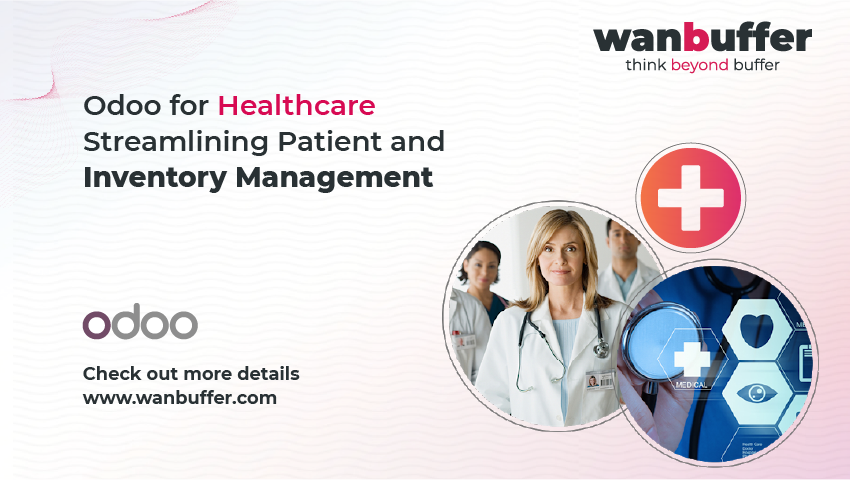
Table of Contents
1. Introduction
The healthcare industry faces growing demands for operational efficiency, accurate patient records, and effective inventory control. Whether it’s a hospital, clinic, or specialty care center, the need for a unified system to manage patients, staff, and medical supplies is critical.
Odoo, with its modular and customizable ERP platform, offers an all-in-one solution that simplifies both patient care and backend operations. It enables healthcare providers to streamline workflows, automate administrative tasks, and ensure the right inventory is available when needed—all while maintaining compliance and security.
2. Challenges in Healthcare Management
Healthcare organizations deal with unique operational challenges that affect both patient outcomes and operational performance:
- Fragmented Systems: Disparate tools for managing appointments, billing, records, and stock lead to inefficiencies.
- Manual Processes: Paper-based records or outdated software increase the risk of human error and data loss.
- Inventory Shortages or Waste: Lack of visibility over medical inventory can lead to stockouts or expired items.
- Compliance and Data Security: Storing and managing sensitive patient data requires strict regulatory compliance (HIPAA, GDPR).
- Poor Integration Between Departments: Miscommunication between administrative, clinical, and procurement teams delays care.
These problems underscore the need for a centralized and integrated healthcare management platform.
3. How Odoo Supports Healthcare Operations
Odoo provides a comprehensive suite of tools tailored for healthcare environments. It allows healthcare organizations to:
- Manage patient information and medical histories securely
- Schedule appointments and treatments with automated reminders
- Track medicine and equipment inventory in real-time
- Automate procurement, billing, and insurance claims
- Generate detailed reports for better decision-making
By integrating these functions into one platform, Odoo eliminates silos and enhances efficiency across departments.
4. Key Features of Odoo for Healthcare Providers
- Patient Management: Store and access medical records, history, prescriptions, and lab results—all from one dashboard.
- Appointment Scheduling: Enable patients to book appointments online, with automatic confirmations and staff scheduling.
- Real-Time Inventory Tracking: Monitor availability of medicines, surgical tools, and PPE across departments and locations.
- Barcode and Lot Tracking: Track medical supplies by batch number, expiry date, or barcode for safety and compliance.
- Integrated Billing and Invoicing: Automate invoices for consultations, treatments, and pharmacy sales, with support for insurance claims.
- HR and Staff Management: Handle staff shifts, payroll, leave, and performance using Odoo’s integrated HR modules.
- Reporting and Analytics: Generate reports on patient traffic, resource usage, stock levels, and costs to drive informed decisions.
Learn more about how Odoo enhances compliance in healthcare
5. Benefits of Using Odoo in Hospitals and Clinics
Implementing Odoo brings a range of business and patient care benefits:
- Improved Patient Experience: Faster service, better communication, and accurate treatment records lead to higher satisfaction.
- Reduced Operational Costs: Automation minimizes administrative overhead and resource wastage.
- Accurate Inventory Control: Ensure that critical supplies are always available, while avoiding overstocking or expiry.
- Better Compliance: Role-based access, audit trails, and encrypted data storage help meet regulatory standards.
- Centralized Management: Unify multiple departments and facilities on a single, scalable platform.
6. Real-World Success Stories
- Multispecialty Hospital in Sydney: Reduced patient waiting times by 30% after implementing Odoo’s appointment and queue management modules.
- Rural Clinic in Texas: Gained full visibility of pharmaceutical inventory, cutting expired stock by 40%.
- Health NGO in Kenya: Automated procurement and reporting with Odoo, improving response time during medical supply shortages.
These examples show that Odoo can be effectively adapted to various healthcare models, from urban hospitals to remote clinics.
7. Conclusion
The healthcare sector needs solutions that are as responsive and dynamic as the care it provides. Odoo offers a unified, intelligent, and secure ERP platform to handle both clinical and administrative operations with ease.
From patient scheduling to pharmacy management, Odoo empowers healthcare professionals to deliver better outcomes while optimizing resources.
Want to transform your healthcare operations? Contact Wan Buffer Services to implement a tailor-made Odoo solution for your clinic, hospital, or medical network.
8. FAQs
-
Is Odoo HIPAA or GDPR compliant for healthcare organizations?
Odoo can be configured to meet HIPAA and GDPR standards through encrypted data storage, user access control, and audit trails.
-
Can Odoo manage multiple healthcare branches or locations?
Yes, Odoo supports multi-branch operations and offers centralized control with localized configurations.
-
How does Odoo handle pharmacy or medical inventory tracking?
With features like barcode scanning, batch and expiry tracking, and automated reordering, Odoo ensures complete control over medical supplies.

